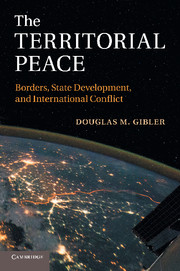Crossref Citations
This Book has been
cited by the following publications. This list is generated based on data provided by Crossref.
Gibler, Douglas M.
and
Randazzo, Kirk A.
2011.
Testing the Effects of Independent Judiciaries on the Likelihood of Democratic Backsliding.
American Journal of Political Science,
Vol. 55,
Issue. 3,
p.
696.
Gibler, Douglas M.
2011.
The Politics of Territorial Threat and Rivalry: An Introduction to this Special Issue.
Conflict Management and Peace Science,
Vol. 28,
Issue. 3,
p.
179.
Gibler, Douglas M.
Hutchison, Marc L.
and
Miller, Steven V.
2012.
Individual Identity Attachments and International Conflict.
Comparative Political Studies,
Vol. 45,
Issue. 12,
p.
1655.
Celestino, Mauricio Rivera
and
Gleditsch, Kristian Skrede
2013.
Fresh carnations or all thorn, no rose? Nonviolent campaigns and transitions in autocracies.
Journal of Peace Research,
Vol. 50,
Issue. 3,
p.
385.
Joyce, Kyle A
and
Braithwaite, Alex
2013.
Geographic proximity and third-party joiners in militarized interstate disputes.
Journal of Peace Research,
Vol. 50,
Issue. 5,
p.
595.
Miller, Steven V
2013.
Territorial disputes and the politics of individual well-being.
Journal of Peace Research,
Vol. 50,
Issue. 6,
p.
677.
Gibler, Douglas M.
and
Braithwaite, Alex
2013.
Dangerous Neighbours, Regional Territorial Conflict and the Democratic Peace.
British Journal of Political Science,
Vol. 43,
Issue. 4,
p.
877.
Gibler, Douglas M.
and
Miller, Steven V.
2013.
Quick Victories?.
Journal of Conflict Resolution,
Vol. 57,
Issue. 2,
p.
258.
Geller, Daniel S.
and
Diehl, Paul F.
2013.
The Forum: Reflections and Reassessments on the Early Work and Ideas of J. David Singer.
International Studies Review,
Vol. 15,
Issue. 2,
p.
259.
Gibler, Douglas M
and
Miller, Steven V
2014.
External territorial threat, state capacity, and civil war.
Journal of Peace Research,
Vol. 51,
Issue. 5,
p.
634.
Mitchell, Sara McLaughlin
and
Trumbore, Peter F.
2014.
Rogue states and territorial disputes.
Conflict Management and Peace Science,
Vol. 31,
Issue. 3,
p.
323.
Nayak, Meghana
2014.
Thinking About Queer International Relations’ Allies.
International Studies Review,
Vol. 16,
Issue. 4,
p.
615.
Carter, David B.
and
Goemans, H. E.
2014.
The temporal dynamics of new international borders.
Conflict Management and Peace Science,
Vol. 31,
Issue. 3,
p.
285.
Arena, Philip
and
Nicoletti, Nicholas P.
2014.
Selectorate theory, the democratic peace, and public goods provision.
International Theory,
Vol. 6,
Issue. 3,
p.
391.
Wright, Thorin M
2014.
Territorial revision and state repression.
Journal of Peace Research,
Vol. 51,
Issue. 3,
p.
375.
Hutchison, Marc L.
2014.
Tolerating Threat? The Independent Effects of Civil Conflict on Domestic Political Tolerance.
Journal of Conflict Resolution,
Vol. 58,
Issue. 5,
p.
796.
Gibler, Douglas M.
2014.
Contiguous States, Stable Borders, and the Peace between Democracies.
International Studies Quarterly,
Vol. 58,
Issue. 1,
p.
126.
Schultz, Kenneth A.
2015.
Borders, Conflict, and Trade.
Annual Review of Political Science,
Vol. 18,
Issue. 1,
p.
125.
McDonald, Patrick J.
2015.
Great Powers, Hierarchy, and Endogenous Regimes: Rethinking the Domestic Causes of Peace.
International Organization,
Vol. 69,
Issue. 3,
p.
557.
Enia, Jason
and
James, Patrick
2015.
Regime Type, Peace, and Reciprocal Effects.
Social Science Quarterly,
Vol. 96,
Issue. 2,
p.
523.





